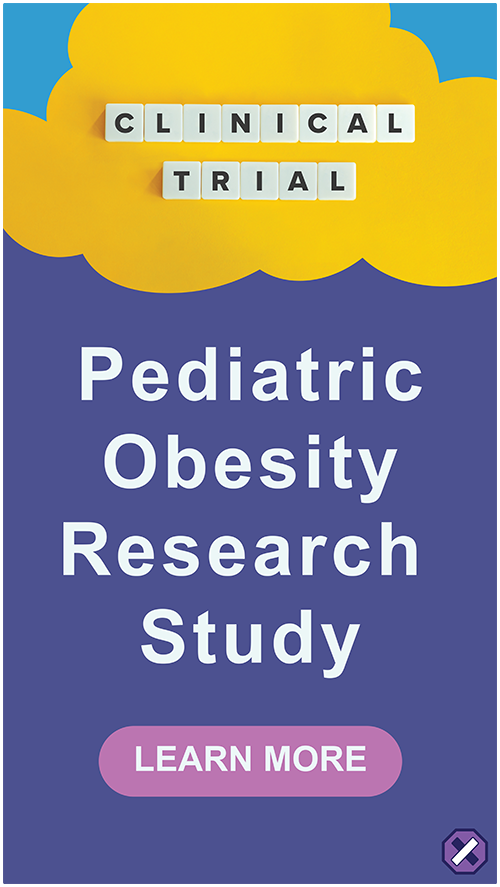Does Your Child Struggle With Obesity?
Join a pediatric obesity clinical trial!
Does Your Child Struggle with Obesity?
Join a pediatric obesity clinical trial!
Benefits of Joining this Clinical Trial
Compensation may be included for time and travel
Study related medication and care provided at no cost
Health insurance is not required

A clinical trial is a carefully designed research study involving human volunteers to investigate the safety and effectiveness of a new drug or treatment. Clinical trials are essential for evaluating the benefits and risks of medical interventions, ultimately informing healthcare decisions and regulatory approvals.
As a clinical trial or observational study participant, your responsibilities and what you will be required to do can vary depending on the study, its objectives, and the phase of the trial.
Some common activities and responsibilities you may encounter as a participant include: diagnostic tests, treatments, procedures, doctor visits, dietary changes, exercise and/or other lifestyle changes. Observational studies often involve minimal effort, such as completing questionnaires, sharing test results, maintaining a diet or exercise log.
Joining a clinical trial can provide access to cutting-edge treatments, close medical monitoring, and an opportunity to contribute to medical knowledge. Participants may experience improved health outcomes and specialized care while potentially receiving compensation for volunteering.
Clinical trials are designed with a strong emphasis on the safety of participants, and multiple safeguards are in place to minimize risks, including careful study design, oversight by institutional review boards and routine monitoring of study data by independent experts. Researchers must inform participants of the risks, benefits and/or side effects they discover.
Yes, you can drop out of a clinical trial study at any time, and you have the right to do so without facing any penalties or consequences. This is often referred to as "withdrawal of consent."
Voluntary participation is a fundamental principle of clinical research. You are not obligated to continue in a trial if you no longer wish to do so.
Determining your eligibility to participate in a clinical trial involves a thorough evaluation of specific eligibility criteria set forth by the study's researchers and sponsors. The criteria help define the patient population being studied and are designed to protect the safety of participants in the trial.
Providing accurate information about your medical history and health status is crucial for your safety and the integrity of the research. If you are not eligible for one trial, you may still be eligible for other trials in the future, so it's worth exploring your options if you are interested in participating in clinical research.
Yes, we do! Have a friend or family member who may also want to participate in one of our studies?
For qualifying studies, we offer a $25 gift card for each friend or family member that you refer. Restrictions apply. Please ask about our referral program during your screening visit.
Have you been unsuccessful in helping your child lose weight? You may be a good fit for a clinical research study. Your child’s participation could make a difference in their health and others. Compensation available for time and travel.
To be eligible, your child must meet the following conditions:
- 12-17 years old
- Have a diagnosis of obesity OR be overweight (based on their BMI)
Pre-diabetes OR type 2 diabetes (which can be diagnosed during screening)
*Other criteria may apply. A study team member will reach out to determine eligibility.
Facts About Childhood Obesity
⭐Physical health affects
Childhood obesity is a serious condition in which a child weighs well above the typical weight for age and height. It can lead to diabetes, sleep apnea, high blood pressure, high cholesterol and several other chronic health conditions (Mayo Clinic, 2025).
⭐Mental health affects
Children who have obesity are also at a higher risk of experiencing low self-esteem, bullying, anxiety, social isolation and eating disorders (Cleveland Clinic, 2025).
⭐How can I determine if my child is obese or overweight?
“Not all children carrying extra pounds are overweight. Some children have larger than average body frames, and children often carry different amounts of body fat at the various stages of development. The body mass index (BMI) that provides a guideline of weight in relation to height, is the accepted measure of overweight and obesity. Growth charts, BMI and other tests can help figure out if a child’s weight could pose health problems.” (Mayo Clinic, 2025).
⭐BMI Calculator for Children and Teens
The formula for determining BMI is different for children and teens than for adults. Are you curious about your child’s body mass index (BMI) category? Try this BMI calculator provided by the Centers for Disease Control and Prevention website.
References
1. Childhood obesity. Mayo Clinic. Accessed Jan. 8, 2025. https://www.mayoclinic.org/diseases-conditions/childhood-obesity/symptoms-causes/syc-20354827
2. Childhood Obesity. Cleveland Clinic. Updated on Feb. 21, 2024. Accessed Jan. 8, 2025. https://my.clevelandclinic.org/health/diseases/9467-obesity-in-children

